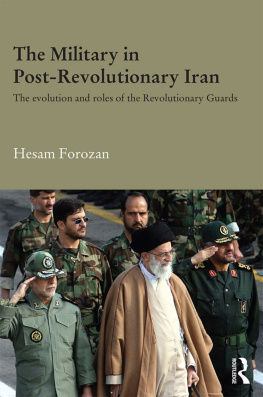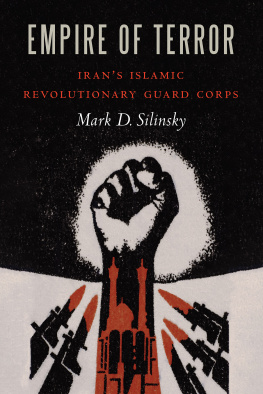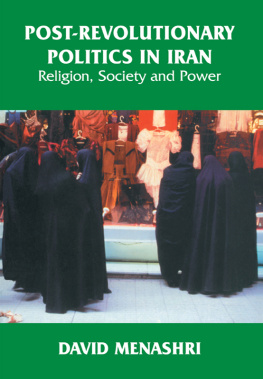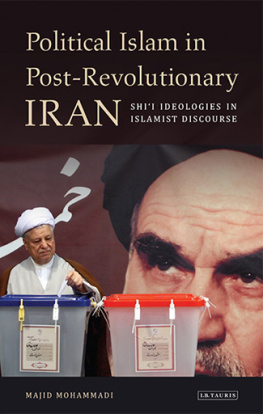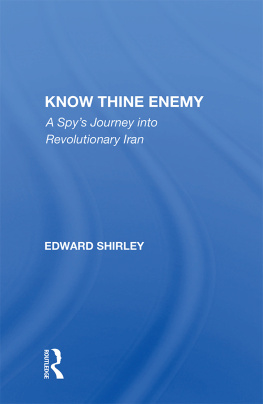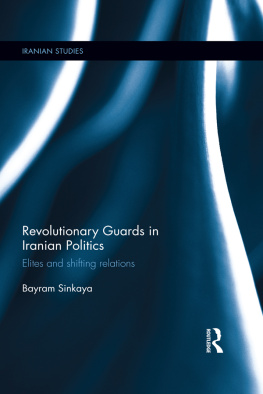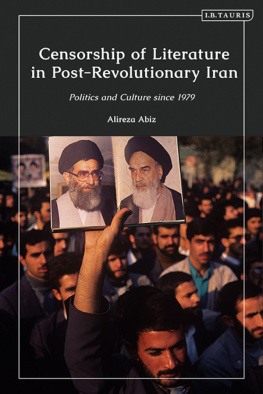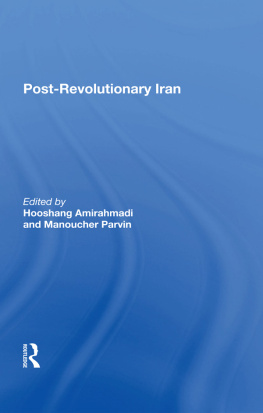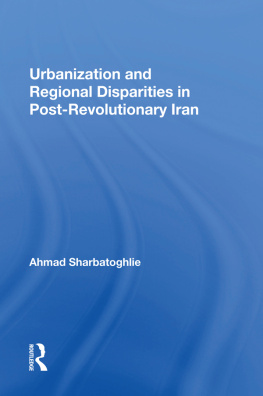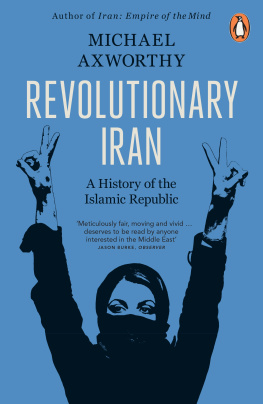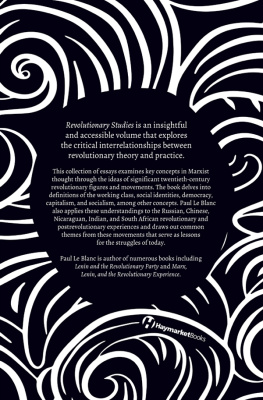The Military in Post-Revolutionary Iran
Irans Revolutionary Guards Corps, also known as the Sepah, has wielded considerable and increasing power in Iran in recent decades. Established in 1979 by Ayatollah Khomeini as a paramilitary organisation charged with protecting the nascent Islamic regime and countering the Imperial Army (or Artesh) whose loyalty was seen as doubtful, the Sepah has evolved into one of the most powerful political, ideological, military and economic players in Iran over recent years. The Sepah is entrusted with a diverse set of indoctrination apparatuses, training programmes and system welfare provisions intended to broaden support for the regime. Although established as a paramilitary organisation, the Sepah developed to have its own ministry, complex bureaucracy and diversified functions, alongside its own network and personnel. This book provides a comprehensive overview of the Sepah and its role. It examines the position of the Sepah in the Iranian state and society, explores the nature of the Sepahs involvement in politics and discusses the impact of the Sepahs political rise on Irans economy and foreign policy. Contemporary Iran can only be fully understood by an awareness of the ongoing infighting among regime factions and increasing popular demands for social change knowing about the Sepah is central to all this.
Hesam Forozan is a visiting Research Fellow at the School of Government and International Affairs at Durham University, UK.
Durham Modern Middle East and Islamic World Series
Series Editor: Anoushiravan Ehteshami, University of Durham
1Economic Development in Saudi Arabia
Rodney Wilson, with Abdullah Al-Salamah, Monica Malik and Ahmed Al-Rajhi
2Islam Encountering Globalisation
Edited by Ali Mohammadi
3Chinas Relations with Arabia and the Gulf, 19491999
Mohamed Bin Huwaidin
4Good Governance in the Middle East Oil Monarchies
Edited by Tom Pierre Najem and Martin Hetherington
5The Middle Easts Relations with Asia and Russia
Edited by Hannah Carter and Anoushiravan Ehteshami
6Israeli Politics and the Middle East Peace Process, 19882002
Hassan A. Barari
7The Communist Movement in the Arab World
Tareq Y. Ismael
8Oman The Islamic Democratic Tradition
Hussein Ghubash
9The Secret IsraeliPalestinian Negotiations in Oslo
Their success and why the process ultimately failed
Sven Behrendt
10Globalization and Geopolitics in the Middle East
Old games, new rules
Anoushiravan Ehteshami
11IranEurope Relations
Challenges and opportunities
Seyyed Hossein Mousavian
12Islands and International Politics in the Persian Gulf
The Abu Musa and Tunbs in strategic perspective
Kourosh Ahmadi
13Monetary Union in the Gulf
Prospects for a single currency in the Arabian Peninsula
Emilie Rutledge
14Contested Sudan
The political economy of war and reconstruction
Ibrahim Elnur
15Palestinian Politics and the Middle East Peace Process
Consensus and competition in the Palestinian negotiation team
Ghassan Khatib
16Islam in the Eyes of the West
Images and realities in an age of terror
Edited by Tareq Y. Ismael and Andrew Rippin
17Islamic Extremism in Kuwait
From the Muslim Brotherhood to Al-Qaeda and other Islamic political groups
Falah Abdullah al-Mdaires
18Iraq, Democracy and the Future of the Muslim World
Edited by Ali Paya and John Esposito
19Islamic Entrepreneurship
Rasem N. Kayed and M. Kabir Hassan
20Iran and the International System
Edited by Anoushiravan Ehteshami and Reza Molavi
21The International Politics of the Red Sea
Anoushiravan Ehteshami and Emma C. Murphy
22Palestinian Christians in Israel
State attitudes towards non-Muslims in a Jewish state
Una McGahern
23IranTurkey Relations, 19792011
Conceptualising the dynamics of politics, religion and security in middle-power states
Suleyman Elik
24The Sudanese Communist Party
Ideology and party politics
Tareq Y. Ismael
25The Muslim Brotherhood in Contemporary Egypt
Democracy defined or confined?
Mariz Tadros
26Social and Gender Inequality in Oman
The power of religious and political tradition
Khalid M. Al-Azri
27American Democracy Promotion in the Changing Middle East
From Bush to Obama
Edited by Shahram Akbarzadeh, James Piscatori, Benjamin MacQueen and Amin Saikal
28ChinaSaudi Arabia Relations, 19902012
Marriage of convenience or strategic alliance?
Naser M. Al-Tamimi
29Adjudicating Family Law in Muslim Courts
Cases from the contemporary Muslim world
Edited by Elisa Giunchi
30Muslim Family Law in Western Courts
Edited by Elisa Giunchi
31Anti-veiling Campaigns in the Muslim World
Gender, modernism and the politics of dress
Edited by Stephanie Cronin
32RussiaIran Relations since the End of the Cold War
Eric D. Moore
33Islam and Pakistans Political Culture
Farhan Mujahid Chak
34Iraq in the Twenty-First Century
Regime change and the making of a failed state
Tareq Y. Ismael and Jacqueline S. Ismael
35Islamism and Cultural Expression in the Arab World
Abir Hamdar and Lindsey Moore
36The Emerging Middle EastEast Asia Nexus
Edited by Anoushiravan Ehteshami and Yukiko Miyagi
37Islamism and Globalisation in Jordan
Daniel Atzori
38The Military in Post-Revolutionary Iran
The evolution and roles of the Revolutionary Guards
Hesam Forozan
First published 2016
by Routledge
2 Park Square, Milton Park, Abingdon, Oxon OX14 4RN
and by Routledge
711 Third Avenue, New York, NY 10017
Routledge is an imprint of the Taylor & Francis Group, an informa business.
2016 Hesam Forozan
The right of Hesam Forozan to be identified as author of this work has been asserted in accordance with sections 77 and 78 of the Copyright, Designs and Patents Act 1988.
All rights reserved. No part of this book may be reprinted or reproduced or utilised in any form or by any electronic, mechanical or other means, now known or hereafter invented, including photocopying and recording, or in any information storage or retrieval system, without permission in writing from the publishers.
Trademark notice: Product or corporate names may be trademarks or registered trademarks, and are used only for identification and explanation without intent to infringe.
British Library Cataloguing-in-Publication Data
A catalogue record for this book is available from the British Library.
Library of Congress Cataloging-in-Publication Data
Forozan, Hesam.
The military in post-revolutionary Iran / by Hesam Forozan.
pages cm. (Durham modern Middle East and Islamic world series ; 38)
Includes bibliographical references and index.
1.IranHistory, Military20th century.2.IranHistory, Military21st century.3.IranHistory19791997.4.IranHistory1997 I.Title.

